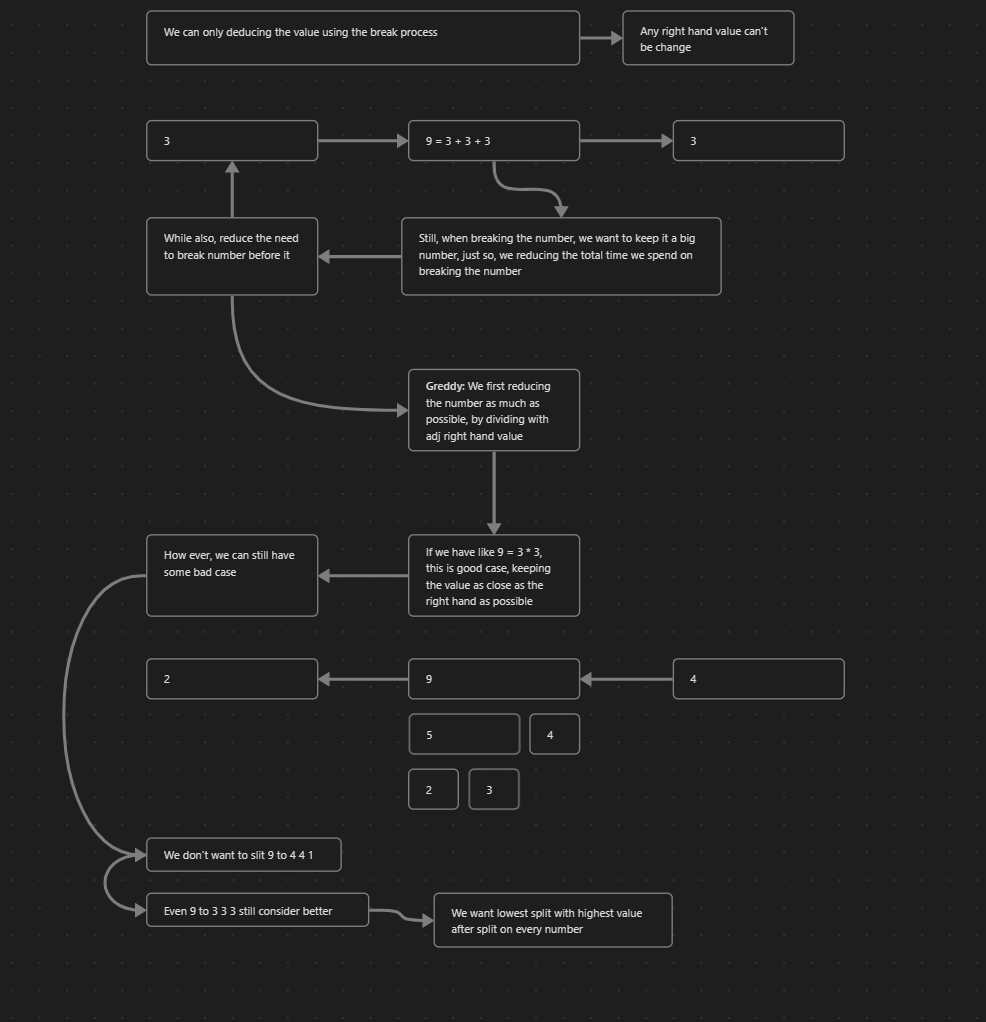2366. Minimum Replacements to Sort the Array
Problem¶
You are given a 0-indexed integer array nums. In one operation you can replace any element of the array with any two elements that sum to it.
- For example, consider
nums = [5,6,7]. In one operation, we can replacenums[1]with2and4and convertnumsto[5,2,4,7].
Return the minimum number of operations to make an array that is sorted in non-decreasing order.
Example 1:
Input: nums = [3,9,3]
Output: 2
Explanation: Here are the steps to sort the array in non-decreasing order:
- From [3,9,3], replace the 9 with 3 and 6 so the array becomes [3,3,6,3]
- From [3,3,6,3], replace the 6 with 3 and 3 so the array becomes [3,3,3,3,3]
There are 2 steps to sort the array in non-decreasing order. Therefore, we return 2.
Example 2:
Input: nums = [1,2,3,4,5]
Output: 0
Explanation: The array is already in non-decreasing order. Therefore, we return 0.
Constraints:
1 <= nums.length <= 10**51 <= nums[i] <= 10**9
Solve¶
Thought on the problem¶
First analysis, I think greedy appear to be the best
Python - Greedy¶
class Solution:
def minimumReplacement(self, nums: List[int]) -> int:
cap = nums[-1]
total = 0
for i, curr in enumerate`-1]`:
if i == 0:
cap = curr
continue
if curr <= cap:
cap = curr
continue
least_divison = curr // cap + int(curr % cap > 0)
total += least_divison
best = curr % least_divison
if best == 0:
best = least_divison
cap = best
return total
Let run it by hand, with input [2 9 4]
- cap = 4, total = 0
- loop (0, 4) => cap = 4
- loop (1, 9) =>
- least_divison = 9 // 4 + int(9 % 4 > 0) = 2 + int (1 > 0) = 3
- total += 3
- 1(to split 9 to 3 pieces, we only need 2 split) - best = 9 % 3 = 0
- best == 0 => best = 3 (This seem wrong)
- cap = 3
- loop (2, 2) => 2 < 3 => cap = 3
- return total = 3 - 1
The first thing to fix is:
total += (least_divison - 1)
best = curr % least_divison ## What??
if best == 0:
best = curr // least_divison
cap = best
We want the best split way, that split curr into least_divison piece that close together
To make it eaiser, using cap directly instead of least_divison
This can be achieve by
def split(x, cap):
if x % cap == 0:
return cap
xmod = x % cap
xdiv = x // cap
minium = xmod
eq = cap
while minium < eq:
minium = minium + xdiv
eq -= 1
return min(eq, minium)
Test:
Hand run 1:
(29, 12)
- xmod = 5
- xdiv = 2
- minimum = 5
- eq = cap = 12
- (5 < 12) =>
- minimum = 5 + 2 = 7
- eq = 12 - 1 = 11
- (7 < 11) =>
- minimum = 7 + 2 = 9
- eq = 11 - 1 = 10
- (9 < 10) =>
- minimum = 9 + 2 = 11
- eq = 10 - 1 = 9
- (11 < 9) => End loop
- return min(11, 9) => return 9
Hand run 2:
(7, 4)
- xmod = 3
- xdiv = 1
- minimum = 3
- eq = 4
- (3 < 4) =>
- minimum = 3 + 1 = 4
- eq = 4 - 1 = 3
- return min(3,4) => return 3
Hand run 3:
(7, 6)
- xmod = 1
- xdiv = 1
- minimum = 1
- eq = 6
- (1 < 6) =>
- minimum = 1 + 1 = 2
- eq = 6 - 1 = 5
- (2 < 5) =>
- (3 < 4) =>
- (4 < 3) =>
- return min(3,4) => return 3
This can round down to one equation, this belong to to do list or just dividing it duh
Final implementation
| Time Submitted | Status | Runtime | Memory | Language |
|---|---|---|---|---|
| 08/30/2023 15:39 | Accepted | 507 ms | 31.3 MB | python3 |
class Solution:
def minimumReplacement(self, nums: List[int]) -> int:
def split(x, cap):
if x % cap == 0:
return cap
xmod = x % cap
xdiv = x // cap
minium = xmod
eq = cap
while minium < eq:
minium = minium + xdiv
eq -= 1
return min(eq, minium)
cap = nums[-1]
total = 0
for i, curr in enumerate`-1]`:
if i == 0:
cap = curr
continue
if curr <= cap:
cap = curr
continue
least_divison = curr // cap + int(curr % cap > 0)
total += least_divison - 1
cap = split(curr, cap)
return total
Time complexity: O(n * ??)
- First loop: O(n)
- While loop with x mod and stuff: O( (cap - x % cap) // (x // cap + 1) ), which worst case should be 10 ** 9 (?); But cap always smaller than x, and by doing one round of maximum worst case will reduce cap greatly afterwards.
I found out it TLE with this input:
Just use divide - (Turn out) it better¶
O(n)
We can split by just used division result, yeah, which do not thing on improving the run times
| Time Submitted | Status | Runtime | Memory | Language |
|---|---|---|---|---|
| 08/30/2023 16:14 | Accepted | 504 ms | 31.1 MB | python3 |
class Solution:
def minimumReplacement(self, nums: List[int]) -> int:
cap = nums[-1]
total = 0
for i, curr in enumerate`-1]`:
if i == 0:
cap = curr
continue
if curr <= cap:
cap = curr
continue
least_divison = curr // cap + int(curr % cap > 0)
total += least_divison - 1
cap = curr // least_divison
return total
Created : September 3, 2023
